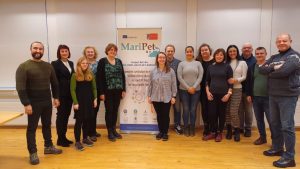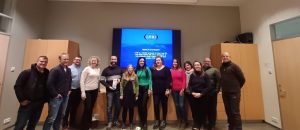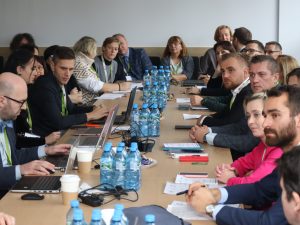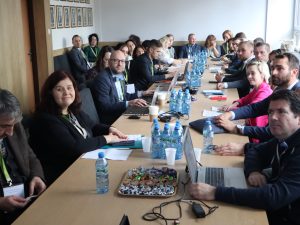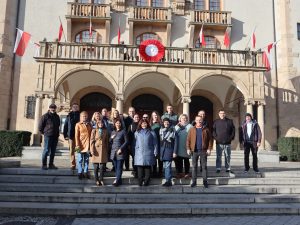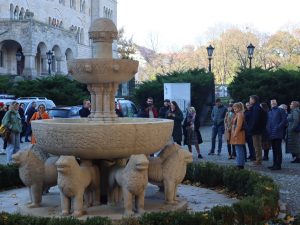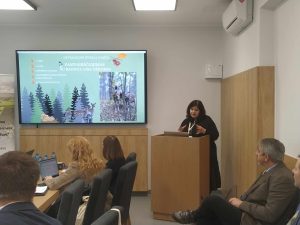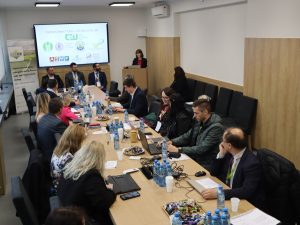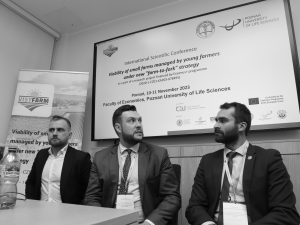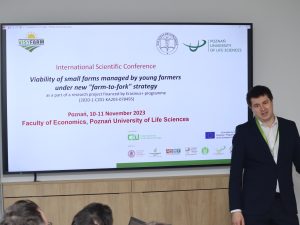Christmas Greetings
Holiday wishes
Invitation to participate in the 30th International Scientific-Practice Conference “HUMAN AND NATURE SAFETY 2024″
We are delighted to invite You to participate in the 30th International Scientific-Practice Conference “HUMAN AND NATURE SAFETY 2024″ organized by Vytautas Magnus University which will be held on 8–10 May, 2024. Conference “HUMAN AND NATURE SAFETY” is organized annually on occasion of the International Days of Health, Environmental Protection and Occupational Safety & Health and on the 100th Anniversary of Agriculture Academy in Lithuania and the Department of Medicinal Plants of the First Lithuanian University Botanical Garden (1924–2024)
The aim of the Conference is to discuss interrelated problems of human health & safety, the development of various technological innovations, environmental issues, to disseminate state-of-the-art research knowledge and to create opportunities for scientists and young researchers to share the research results not only among researchers and students, but also for professionals in agriculture and forestry, environmental and health sciences and other fields emphasizing the importance of human safety and environmental protection.
CONFERENCE SECTIONS:
- Biosystem Engineering (9th May, 2024):
– Technical and technological innovation for sustainable production;
– Precision engineering technologies and environmental protection;
– Technology safety, occupational risk, ergonomics;
– Water engineering. - Environment and Health (8th May, 2024):
Dedicated to the 100th Anniversary of the Department of Medicinal Plants of the First Lithuanian University Botanical Garden (1924–2024)
– Research of risk factors in living environment and their effects on human health;
– Conservation, research, rational and sustainable use of biodiversity.
- Ecology, Sustainable Forestry (9th May, 2024):
– Environmental research of agro, hydro and forestry ecosystems;
– Sustainable development, protected areas, environmental impact of human activities;
– Silviculture, forest protection and multi-purpose use, recreational forestry;
– Hunting research, management of wild animal populations.
Conference seminars:
- Medicinal, spice (aromatic) plants: current trends and future perspectives (8th May, 2024);
- The relationship between human and nature (10th May, 2024).
Registration to the conference is active till 9th, February, 2024.
The submission deadline for scientific articles is 4th, March, 2024. Scientific articles will be published in the selected papers of the International Scientific-Practice Conference “HUMAN AND NATURE SAFETY”, indexed in the Central & Eastern European Academic Source (EBSCO) database.
CONFERENCE ANNOUNCEMENT (*.pdf)
Contacts:
Vytautas Magnus University
Studentų g. 15a-204, LT-53362, Akademija, Kauno r.
Chairperson of the organizing committee – dr. Gediminas VASILIAUSKAS
Tel. +370 689 77015
Conference administrator – Nijolė POŠKIENĖ
Tel. +370 37 752357
Conference e-mail: zmogaus.sauga@vdu.lt
More information available on the conference website https://zgs.vdu.lt/
Conference events might be filmed and / or photographed and you can be seen in the photos or videos of the event, which can be posted on various media.
Holiday wishes
Learning Platform “Greenfluencer” – Tested!
The GreenCool – ‘Let me influence your green self! – Skill development in the encouragement of mindset towards environmental awareness and sustainable development in the alliance of ECoC’ project funded by the European Union continues with many activities.
Project partners: University of Pannonia (coordinator), Militos Consulting S.A., Vytautas Magnus University, West University of Timisoara, University of Tartu.
The general goal of the project is to develop environmental awareness among university students and to spread the thought of sustainable development among the widest possible age groups at events that attract large audience. We committed to develop an innovative online course material and to mainstream sustainable development in all curricula for higher education students. After the MOOC course development in 2023 Autumn semester, Blended ECoC Greenfluencer pilot course (blended learning: online lessons and offline classroom lessons) at national level at four European Capital of Culture Universities (Tartu, Kaunas, Timisoara and Veszprém) has been held. The aim of the course was to develop individual opinions on green topics based on the course content and to implement an individual, pair or group project on a green topic by participating in an event using a communication tool according to students’ choices.
We are happy to share, that during 2023/2024 fall semester, students of Faculty of Bioeconomy Development had the opportunity to expand their knowledge of “Business Communication” and “Rhetoric and Communication” subjects by deepening their knowledge in the ECoC Greenfluencer pilot course. In addition, students had the opportunity to participate in an event “Reflecting Land Art”, responding to the “Kaunas – European Capital of Culture 2022” Land Art festival.
During spring semester of 2023/2024 school year, students of Faculty of Bioeconomy Development will have one more opportunity to participate in the international MOOC: “ECoC Greenfluencer” course at the University of Tartu.
Join the 4th International Scientific Conference on Sustainable Bioeconomy Development
The 4th International Scientific Conference, “Sustainable Bioeconomy Development 2024: Theory and Practice” is on the horizon, and we extend a warm invitation for you to join this pivotal gathering that is set to redefine the global landscape of social sciences in bioeconomy field.
After the resounding success of our previous conference, where leaders, researchers, and industry practitioners gathered to explore the intricacies of sustainable bioeconomy development, we are excited to announce our upcoming event.
Conference Overview: Date: May 8, 2024
Location: Online
Topics of Scientific Discussions will cover a diverse range of themes crucial to the advancement of sustainable bioeconomy:
- Bioeconomy Contribution to the European Green Deal
- Role of Innovative, Sustainable, and Inclusive Bioeconomy in the Development of Rural Areas
- Logistics and Marketing of Biological Resources and Bioproducts
- Innovative Business Solutions in the Bioeconomy
The special Focus Session of the conference will host a dedicated theory and practice synergy session on “Territorial Circular Systemic Solutions for Sustainable Bioeconomy Development,” providing a platform for profound discussions and collaborative exploration of innovative strategies.
The 4th International Scientific Conference, “Sustainable Bioeconomy Development 2024: Theory and Practice” offers an influential platform to engage with cutting-edge research findings, evolving policy landscapes, and industry trends shaping the global bioeconomy. It’s an opportunity to network with diverse perspectives, foster collaborations, and ignite innovative solutions for sustainable bioeconomic development.
Secure your spot at this dynamic gathering by registering for the conference scheduled on May 8, 2024. Take part in an event that nurtures learning, fosters networking, and drives actionable insights toward positive change in the bioeconomy landscape.
Registration is required. Visit our website https://sbd.vdu.lt to register and secure your place at the forefront of sustainable bioeconomy innovation.
Join us in shaping the future of sustainable bioeconomy development.
Warm regards,
Representing the Organizing Committee of the International Scientific Conference on “Sustainable Bioeconomy Development”
The 4th meeting of the Erasmus+ MARIPET project in Reykjavik
The fourth meeting of the Erasmus+ project “Innovative Curriculum to Evaluate Marine Fishery Discards as Raw Pet Food for Sustainable Europe” [MARIPET] took place on 28th and 29th November at the Agricultural University of Iceland in Reykjavík. Prof. Dr. Aušra Blinstrubienė, Vice-Chancellor of the Agricultural University, and Dr. Anželika Dautartė, Associate Professor at the Department of Environment and Ecology, participated in the meeting.
During the visit, the Vice-Chancellor met with Ragnheidur Inga Thorarinsdottir, Rector of the Icelandic University of Agriculture, to look into prospective scientific and educational collaboration.
Dissemination activities are scheduled to occur in all project nations in January 2024, as stated on the first day of the meeting, which focused on the completion of the project. The unique five-module curriculum, the online learning platform, the experts’ and producers’ platform for pet food, and the pilot testing of the curriculum in the first week of February were the main points of discussion. The manual/e-book on producing pet food from discarded fish has been finished in terms of organisation, publishing, and distribution.
On the second day of the meeting, a visit was made to the LYSI company. Founded in 1938, LYSI is one of the world’s largest producers of marine oil for human consumption and a pioneer in fish oil production. Today, more than 95% of LYSI’s energy consumption comes from renewable sources. LYSI is one of the main actors in Iceland’s policy to achieve full utilisation of all fishing industry inputs. As a leading expert in the production of valuable products from by-products and waste from traditional fish production, the company makes a significant contribution to the responsible use of natural resources.
Another site visited was BRIM, one of Iceland’s largest fishery companies. Responsible fishing and use of marine ecosystems ensures long-term interests and value creation for employees, shareholders, and society. The company measures its carbon emissions and decisions on fishing and processing here are based on economic and environmental considerations. The company is also committed to long-term carbon neutrality and has set a target to reduce its greenhouse gas intensity (tCO2/m€) by 40% between 2015 and 2030.
The project is coordinated by Ege University (Turkey), project partners: University of Balikesir (Turkey), University of Dubrovnik (Croatia), Agricultural University of Iceland, Izmir Metropolitan Municipality (Turkey), Norwegian University of Science and Technology, and Vytautas Magnus University.
The final meeting of the project will take place at Ege University on 7-8 February. The project will end on 28 February 2024.
VISYFARM project “Viability of small farms managed by young farmers in the context of the Farm to Table strategy” Final conference at the University of Life Sciences in Poznan, Poland
Prof. dr. V. Atkočiūnienė, doc. dr. J. Zaleckienė and doc. Erika Zabulionienė participated in the final conference of the Erasmus+ project VISYFARM “Viability of Small Farms Managed by Young Farmers under New Farm-to-Fork Strategy” (2020-1-CZ01-KA203-078495) at the University of Life Sciences in Poznan (Poland), on 10-11 of November, 2023.
The project is coordinated by the Czech University of Life Sciences in Prague and the partners were Poznan University of Life Sciences (Poland), University of Szeged (Hungary), Vytautas Magnus University of Agriculture (Lithuania), Slovak University of Agriculture in Nitra. The link between science and practice is ensured by the associations representing young farmers: the Czech Association of Young Farmers, the Polish Union of Rural Youth and the Slovak Association of Young Farmers (ASYF).
The Green Deal for Europe’s “Farm to Table” strategy seeks strategic solutions in the agriculture and food supply chain and changes in production to move towards sustainable and low-carbon farming. The strategic objectives of the Common Agricultural Policy (CAP) 2021-2027 focus on the viability and resilience of farms and rural areas, the balance of market forces in the food supply chain and competitiveness, and generational change.
An international team has prepared an overview and evaluation of previous and new CAP measures for young farmers running small farms. The good practices collected and analysed help to understand how farms can work together to develop short food supply chains and improve their long-term economic and social situation. Another outcome of the project will be the development of Farming Decision Support Tools using IT.
The plenary session of the final conference of the project included presentations on the participation of small-scale farmers in short food supply chains, and the identification of measures to help farms cope with the challenges posed not only by the Covid-19 pandemic and the war in Ukraine, but also by climate change and increasing uncertainty. Insights were shared on the transformation of food systems, as well as the challenges of smallholder farm viability in the context of farm succession and generational change.
In the second part of the closing conference, representatives from each partner country presented the results achieved by the VISYFARM project. The Polish project partner, Prof. Wawrzyniec Czubak, UPP, presented the role of smallholder farms, which account for a significant proportion (50-65%) of the total number of farms, in the overall rural ecosystem. It was pointed out that young farmers strive to be active and innovative players in the market, to establish themselves and to remain competitive in the market. All the participants of the conference were engaged by the presentation of Prof. Dr. V. Atkočiūnienė, (VMU AA) on the best practices of small farm development in Lithuania. The mobile farm “Bagota ciba”, the farm “Vilkės Farm”, which promotes sustainability in production and love for the environment, and the Šironai family farm, which connects several generations of the family, were presented. The speakers pointed out that there are many opportunities in rural areas, thanks to EU structural and national support measures, European Innovation Partnership initiatives, changing consumer lifestyles, and partnerships between different market players.
The importance of partnerships in organising short food supply chains was discussed by Habil. Dr Kris Krisztián. Cooperation between farmers facilitates business growth, more efficient investment of EU structural support, reduction of operating costs, etc. Although the benefits of partnerships are clear, the involvement and participation in agricultural cooperatives has quite different traditions in different EU countries. As generations of farmers change, attitudes towards cooperation change, as do the models of cooperation themselves. Young farmers are more open to innovation and the digitalisation of business.
The project partners from Slovakia, Assoc. Prof. Dr. Patric Rovny and Ing. Dr. Jana Gálová from the Slovak University of Agriculture in Nitra, presented a practical digital tool – a spreadsheet for young farmers to make informed business decisions. The project coordinating partner from the Czech Republic, Dr. Pavel Kotyza, presented a digital tool for comparing market prices of agricultural products or inputs.
The project partners aim to ensure that the results are not just reported, but used in practice or for further research and shared with students.
The last part of the conference included a young farmers’ panel “Small Farms and Young Farmers – Recommendations for Development”, where young farmers shared their experiences in developing their farms and the activities of the young farmers’ organisations they represent, as well as their insights on the general situation in agriculture, agricultural policy, sustainability, the benefits of cooperation and other issues of relevance to small farms.
On the second day of the meeting, VISYFARM participants walked around the city of Poznan celebrating the St. Martin’s Day and Polish Independence Day, tasted and enjoyed St Martin’s croissants.
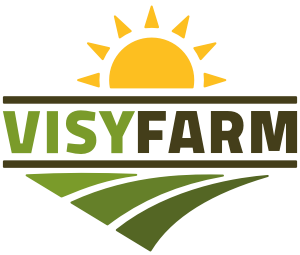

CONFERENCE “YOUNG SCIENTIST 2024”
The 21st annual conference of young scientists “YOUNG SCIENTIST 2024” organized by the Vytautas Magnus University Agriculture Academy (VMU AA) will be held on April 11 2024 remotely. The conference is intended for the first, second and third degree students. The purpose of the conference is to involve students in scientific activities, develop the ability to publicize scientific research results, present their scientific research achievements and discuss topical issues of bioeconomy, green course, climate change, ecosystem sustainability, rational use and protection of natural resources.
There is no conference fee for students. Certificates of conference participants will be awarded to the speakers of the conference.
Speakers will be able to publish articles in the collection of articles of the conference “YOUNG SCIENTIST 2024” or in another scientific publication, for example, in the scientific journal „Agricultural engineering“ or another, after submitting articles that meet the requirements for articles in a scientific publication.
| Conference topics | Subtopics |
| Bioeconomy | Accounting and finance: challenges and opportunities |
| Bioeconomy, sustainability of agriculture and food sector | |
| Innovations and solutions in business logistics | |
| Management of agri-business and other bioeconomy business organizations | |
| Sustainable development of rural areas | |
| Biosystems engineering | Energy engineering |
| Land management | |
| Mechanical engineering | |
| Technology engineering | |
| Transport engineering | |
| Water engineering | |
| Sustainability of agricultural, forest, and water ecosystems | Agronomy |
| Food quality and safety | |
| Sustainability of agricultural ecosystems | |
| Ecosystem services | |
| Sustainable forestry | |
| Wildlife population management |
Pre-registration for the conference until February 15, 2024.
Articles for the conference “YOUNG SCIENTIST 2024” are accepted until March 8, 2024. (the link to upload the article). The articles must be prepared according to the recommendations for the authors of the articles (Annex 1_Article template, Annex 2_Authors guarantee letter).
Contests for Teaching and Training Visits under Erasmus+ Programme
International Cooperation Department invites all VMU academic and non-academic staff members to participate in the Erasmus+ contests: the contest for Erasmus+ teaching visits in Programme countries (EU/EEA countries) and the contest for Erasmus+ teaching and training visits in Partner countries (non-EU/EEA countries). The visits will be conducted in the 2023/2024 academic year.
The aim of the teaching visit is to read lectures for students of a university abroad and attract them to study under Erasmus+ at Vytautas Magnus University.
The aim of the training visit is to participate in training events held abroad (except for conferences) or do work internship (observe work, participate in training activities) in universities abroad. This activity encourages professional development of academic and non-academic staff.
The announced contests are:
- Contest for Erasmus+ teaching visits in Programme Countries (EU/EEA)
- Contest for Erasmus+ teaching and training visits in Partner Countries (non-EU/EEA)
VMU lecturers and employees are invited to apply for contests until December 1st. The selection criteria and requirements for applications are provided in the descriptions of the contests.
More information is provided by the VMU International Cooperation Department (erasmus@vdu.lt).
- About
- About Agri-Food BM programme
- Academic infrastructure units
- All events
- All news
- Aquaculture center
- Archives
- Biosystems Engineering
- Center of Animal husbandry selections, breeding values and dissemination
- Centre of Biosystems Engineering, Biomass Energetics and Water Engineering
- Circular Biobased Economy
- Climate change
- Contacts
- Contacts
- Events
- Events archive
- Faculties
- For business and society
- Innovative products
- International Cooperation
- International projects
- Joint Research Centre of Agriculture and Forestry
- Journal “Human and Nature Safety”
- Laboratory of Technology Safety
- Laboratory services
- Living Environment
- More labs
- News
- Project
- QUALS project description
- Research
- Research areas
- Scientific events
- Scope
- Sitemap
- Studies
- Study programmes
- Technology Transfer & Commercialization
- THE ROLE OF ORGANISATION IN THE PROJECT
- THE ROLE OF ORGANISATION IN THE PROJECT
- THE ROLE OF ORGANISATION IN THE PROJECT
- The Study Process
- Žemės ūkio žinių ir inovacijų sistemos klasteris










